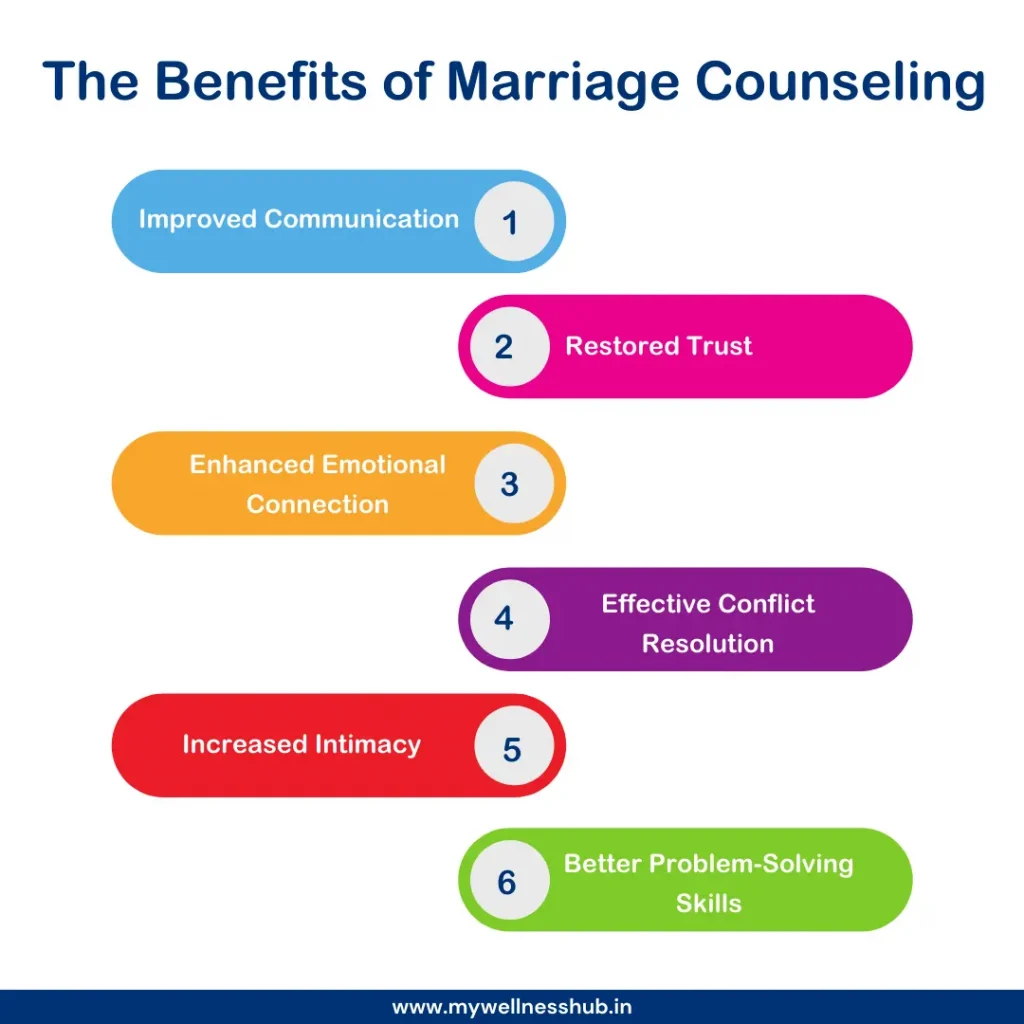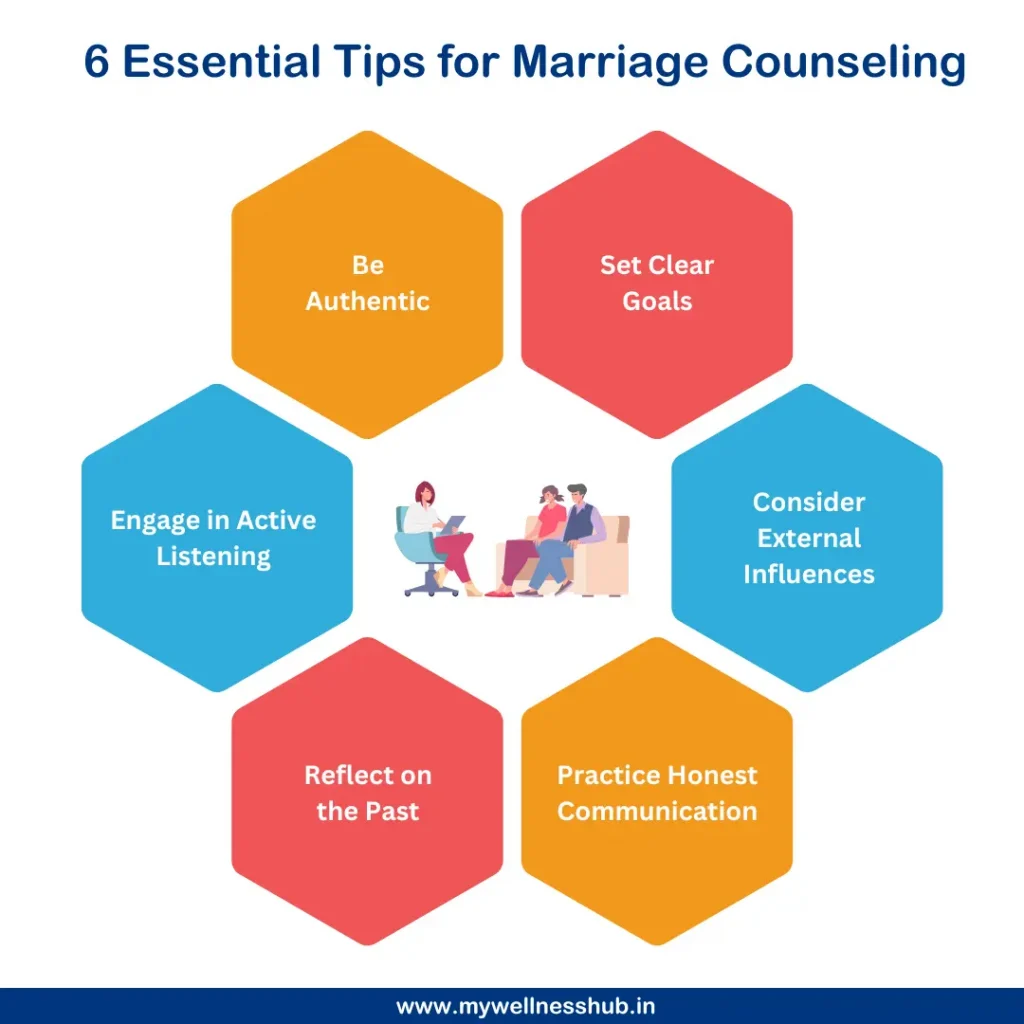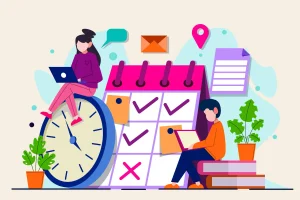6 Essential Marriage Counseling Tips You Need to Know
By Prapoorna M
Last Updated: June 21, 2024
Marriage counseling is a valuable resource for couples facing challenges in their relationship. Whether it’s communication issues, conflicts, or simply growing apart, seeking professional help can make a significant difference. By engaging in marriage counseling, couples can learn effective strategies to strengthen their bond and navigate through difficult times together. This article will explore six essential marriage counseling tips that can help you and your partner build a healthier and happier relationship. These tips are designed to be practical and easy to implement, providing you with the tools you need to enhance your connection and overcome obstacles. Let’s dive into these six crucial pieces of advice that can transform your marriage for the better.

1. Be Authentic
Explanation of authenticity in a relationship
Authenticity in a relationship means being genuine and true to yourself. It involves expressing your true feelings, thoughts, and experiences without fear of judgment. When both partners are authentic, they create a foundation of trust and openness, which is crucial for a healthy relationship.
Importance of being true to yourself in counseling
Being true to yourself in counseling is essential because it allows for honest communication. During therapy sessions, it’s important to share your genuine thoughts and feelings with your partner and counselor. This honesty helps in identifying the real issues that need to be addressed and fosters a deeper connection between partners.
Benefits of honesty and transparency
Honesty and transparency in a relationship lead to several benefits:
- Improved Communication: Open communication helps partners understand each other’s needs and perspectives better.
- Stronger Connection: Being honest creates a deeper emotional bond and trust.
- Conflict Resolution: Transparency allows couples to address issues directly and work towards solutions together.
- Personal Growth: Authenticity encourages self-awareness and personal development.
Also read: Effect of love and compassion in our life

2. Consider External Influences
Discussion on how external opinions affect relationships
External opinions, whether from family, friends, or societal norms, can significantly impact how we view our partners and our relationship. These influences can sometimes create unnecessary pressure or expectations that may not align with the reality of the relationship. It’s crucial to recognize these external factors and understand how they shape your perceptions.
Importance of recognizing and addressing these influences
Acknowledging the impact of external influences is the first step towards mitigating their effects. By discussing these influences with your partner, you can ensure that your relationship decisions are based on mutual understanding rather than outside opinions. This helps in maintaining a united front and strengthens the relationship.
Strategies to maintain a united front with your partner
- Open Communication: Regularly discuss how external opinions are affecting your relationship.
- Set Boundaries: Establish clear boundaries with friends and family regarding their involvement in your relationship.
- Support Each Other: Stand by your partner and make decisions together, keeping your relationship’s best interest in mind.
- Seek Professional Guidance: A counselor can help you navigate and manage external influences effectively.
3. Set Clear Goals
Importance of goal setting in marriage counseling
Setting clear goals in marriage counseling provides direction and purpose. Goals help you and your partner focus on what you want to achieve from your therapy sessions, making them more productive and effective. Clear objectives also allow you to measure your progress and stay motivated throughout the process.
Examples of common goals
- Improving Communication: Enhancing the way you talk and listen to each other.
- Conflict Resolution: Developing healthier ways to resolve disagreements.
- Identifying Root Causes: Understanding the underlying issues that lead to conflicts.
- Rebuilding Trust: Working on rebuilding trust if it has been broken.
How clear objectives help in tracking progress
Clear goals provide a roadmap for your counseling journey. They help you:
- Stay Focused: Keep your sessions on track by addressing specific issues.
- Measure Progress: Regularly assess how far you’ve come and what still needs improvement.
- Stay Motivated: Seeing tangible progress can be encouraging and keep you committed to the process.
Common Goals in Marriage Counseling
| Goal | Description |
|---|---|
| Improving Communication | Enhance the way you talk and listen to each other. Effective communication involves active listening, expressing thoughts clearly, and understanding your partner’s perspective to avoid misunderstandings and build a stronger connection. |
| Conflict Resolution | Develop healthier ways to resolve disagreements. This includes learning to manage and resolve conflicts without escalating them, using techniques such as compromise, negotiation, and understanding each other’s viewpoints. |
| Rebuilding Trust | Work on rebuilding trust if it has been broken. Trust can be rebuilt through consistent honesty, keeping promises, and demonstrating reliability over time, allowing partners to feel secure and confident in their relationship. |
| Identifying Root Causes | Understand the underlying issues that lead to conflicts. This involves looking beyond the surface-level arguments to identify deeper issues, such as unmet needs, past traumas, or differing values that may be causing tension in the relationship. |
| Enhancing Emotional Intimacy | Strengthen the emotional connection between partners. Emotional intimacy can be enhanced by sharing vulnerabilities, spending quality time together, expressing appreciation, and showing empathy and support for each other’s feelings and experiences. |
4. Practice Honest Communication
The role of honesty in a successful relationship
Honesty is the cornerstone of any successful relationship. Being truthful with your partner fosters trust, strengthens the bond between you, and lays a solid foundation for a lasting connection. When both partners commit to honesty, it becomes easier to navigate conflicts and challenges together.
Challenges and importance of truthful communication in therapy
While honesty is crucial, it can be challenging to practice, especially during therapy. Fear of hurting your partner’s feelings or facing uncomfortable truths can tempt you to withhold information or tell white lies. However, truthful communication is vital in therapy as it helps identify and address the core issues in the relationship. By being open and honest, you allow the therapist to guide you more effectively toward resolving your problems.
Strategies to communicate effectively and openly
- Create a Safe Space: Ensure that both you and your partner feel safe to express your thoughts and feelings without judgment.
- Be Clear and Direct: Communicate your feelings and concerns clearly and directly, avoiding vague statements.
- Use “I” Statements: Frame your comments from your own perspective to avoid sounding accusatory (e.g., “I feel…” instead of “You always…”).
- Practice Empathy: Try to understand your partner’s perspective and show empathy towards their feelings.
- Seek Clarification: If you don’t understand something, ask questions to ensure clarity and prevent misunderstandings.
Read more: Better ways to communicate in relationships
5. Reflect on the Past
Impact of past experiences on current relationships
Past experiences, especially those from childhood or previous relationships, can significantly influence your current relationship dynamics. Unresolved issues or traumas can manifest as trust issues, communication problems, or unhealthy behavior patterns. Recognizing the impact of these past experiences is essential for understanding and addressing current relationship challenges.
Importance of discussing past traumas and events
Discussing past traumas and significant events with your partner and therapist is crucial for healing. It allows you to understand the root causes of certain behaviors and emotional responses. By bringing these issues to light, you can work together to overcome them and build a healthier relationship.
How reflecting on the past can help build a healthier present relationship
Reflecting on the past helps in:
- Healing Old Wounds: Addressing unresolved issues can lead to emotional healing and closure.
- Breaking Negative Patterns: Understanding past influences helps in breaking unhealthy behavior patterns.
- Building Empathy: Sharing past experiences fosters empathy and understanding between partners.
- Enhancing Communication: Open discussions about the past improve overall communication and trust.
Impact of Past Experiences
| Past Experience | Current Impact |
|---|---|
| Childhood Trauma | Trust issues, fear of abandonment. Experiences of neglect, abuse, or instability in childhood can lead to difficulties in trusting others and a persistent fear of being abandoned in adult relationships. |
| Previous Relationship Issues | Insecurity, communication problems. Past relationships marked by betrayal, conflict, or poor communication can result in ongoing feelings of insecurity and difficulties in communicating effectively with a current partner. |
| Family Dynamics | Expectations, conflict resolution styles. The way conflict was handled and expectations were set in one’s family of origin can influence how one approaches conflicts and sets expectations in their current relationship. |
| Personal Loss or Grief | Emotional distance, difficulty in forming new attachments. The loss of a loved one can create emotional barriers and make it challenging to form new, deep connections due to fear of future loss. |
| Major Life Changes | Stress, differing priorities. Significant changes such as career shifts, moving, or health issues can introduce stress and shift priorities, potentially causing strain and misalignment in a relationship. |
6. Engage in Active Listening
Explanation of active listening and its importance
Active listening is a communication technique that involves fully focusing on, understanding, and responding to your partner’s words. It goes beyond just hearing what the other person is saying; it requires paying attention to the emotions and intentions behind the words. Active listening is essential for effective communication and relationship building.
Techniques for practicing active listening
- Maintain Eye Contact: Show that you are fully engaged by looking at your partner while they speak.
- Avoid Interrupting: Let your partner finish their thoughts before responding.
- Reflect Back: Summarize what your partner has said to ensure understanding (e.g., “What I hear you saying is…”).
- Show Non-Verbal Cues: Nod your head, smile, and use other body language to show you are listening.
- Ask Clarifying Questions: If something is unclear, ask questions to gain a better understanding.
Benefits of active listening in improving relationship understanding
- Enhanced Empathy: Understanding your partner’s perspective fosters empathy and emotional connection.
- Reduced Misunderstandings: Clarifying and reflecting back reduces the chances of misunderstandings.
- Improved Conflict Resolution: Active listening helps in resolving conflicts by ensuring both partners feel heard and understood.
- Stronger Bond: Consistently practicing active listening strengthens the emotional bond between partners.
Conclusion
In this article, we’ve explored six essential marriage counseling tips that can help strengthen your relationship. These tips include being authentic, considering external influences, setting clear goals, practicing honest communication, reflecting on the past, and engaging in active listening. By being genuine in your interactions, discussing and setting clear goals, and prioritizing honest communication, you can build a stronger connection with your partner. Reflecting on past experiences and actively listening to each other can also pave the way for a healthier relationship.
At Wellness Hub, we are dedicated to providing practical advice and professional support to help you navigate your relationship challenges. For more personalized guidance, explore our resources designed to support couples on their journey to a happier marriage.
Frequently Asked Questions:
1. What are the benefits of marriage counseling?
Marriage counseling can improve communication, resolve conflicts, and strengthen the emotional connection between partners. It provides a safe space to discuss issues and develop healthier relationship patterns.
2. How can authenticity help in marriage counseling?
Being authentic means being true to yourself and your partner. This honesty fosters trust and deeper connections, making it easier to address and resolve underlying issues during counseling.
3. Why is it important to consider external influences on your relationship?
External influences, such as opinions from family and friends, can affect how you view your partner and your relationship. Recognizing these influences helps you make relationship decisions based on mutual understanding rather than outside pressure.
4. What are some common goals in marriage counseling?
Common goals include improving communication, resolving conflicts, rebuilding trust, and understanding the root causes of issues. Setting clear goals helps couples stay focused and measure progress during counseling.
5. How does honest communication impact marriage counseling?
Honest communication is crucial as it helps identify and address the real issues in the relationship. It fosters understanding and trust, which are essential for resolving conflicts and building a stronger bond.
6. How can reflecting on past experiences improve my current relationship?
Reflecting on past experiences, especially unresolved traumas, helps in understanding their impact on current behaviors and expectations. Addressing these past issues can lead to healing and a healthier present relationship.
7. What is active listening and why is it important in a relationship?
Active listening involves fully focusing on, understanding, and responding to your partner’s words. It improves communication, reduces misunderstandings, and strengthens the emotional connection between partners.
8. How can I implement these marriage counseling tips in my daily life?
Start by being honest and authentic with your partner, discussing and setting clear goals, and always practicing open communication. Reflect on past experiences and actively listen to each other to build a stronger relationship.
9. Where can I find more resources on improving my relationship?
For more insights and support on improving your relationship, visit our relationship advice page at Wellness Hub. Our expert counselors are here to help you every step of the way.
10. How can Wellness Hub help in my marriage counseling journey?
Wellness Hub offers practical advice and professional support tailored to your relationship needs. Our resources and expert counselors can guide you through your challenges and help you build a healthier and happier marriage.
About the Author:
Prapoorna Mangalampalli
M.Sc., M.A., (Dual Masters in Psychology & English) – Counselor (6+ years of experience)
Prapoorna, with dual Master’s degrees in Psychology and English and over 6 years of experience, elevates human experiences through insightful counseling. She excels in online, marital, relationship, child, family, and career counseling. At Wellness Hub, she thrives in a team environment, valuing innovation, compassion, and client success.
Connect with Prapoorna to find your voice and build a brighter future.
Book your Free Consultation Today
Parent/Caregiver Info:
Client’s Details:
* Error Message









